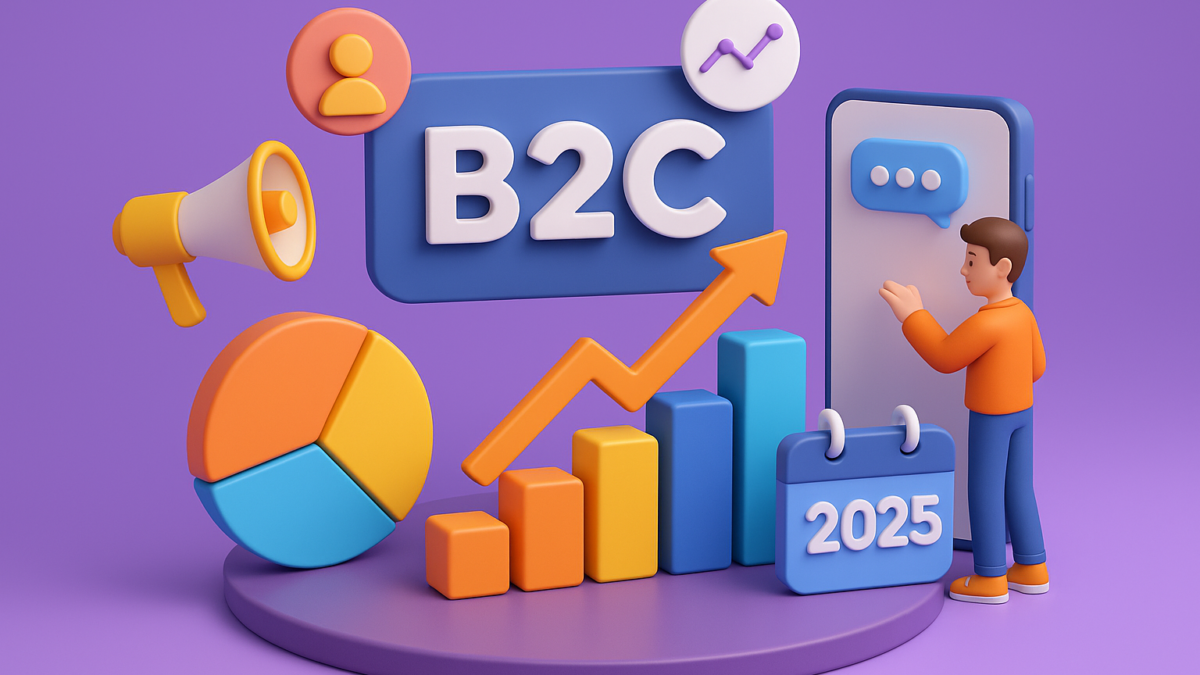B2C Marketing in 2025: Strategies to Boost Engagement & Growth
In the digital-first world of 2025, B2C marketing is no longer just about promotions or advertising. It’s about creating personalized, meaningful experiences that resonate with customers at every touchpoint.
From AI-powered personalization to omnichannel engagement, brands must adapt to evolving consumer expectations. This blog explores the latest B2C marketing strategies, trends, and tactics that help brands connect, convert, and retain customers.
What Is B2C Marketing?
B2C (Business-to-Consumer) marketing refers to strategies that companies use to sell products or services directly to individual customers. Unlike B2B, B2C marketing focuses on emotions, preferences, and instant gratification to drive purchase decisions.
Key components of B2C marketing include:
- Brand storytelling that creates emotional connections
- Personalized offers and experiences
- Omnichannel engagement across social, email, web, and mobile
- Data-driven strategies to optimize campaigns and ROI
Why B2C Marketing Is Critical in 2025
The B2C landscape has changed dramatically due to technology and consumer behavior shifts:
- Hyper-Personalization: Consumers expect tailored recommendations based on their behavior and preferences.
- Real-Time Engagement: Social media, messaging apps, and push notifications demand immediate interaction.
- Data-Driven Insights: Brands now use AI and analytics to understand customer intent and improve targeting.
- Omnichannel Presence: Consistency across online and offline touchpoints enhances loyalty and conversions.
- Content is King: Interactive and authentic content drives trust and engagement.
According to Salesforce, 84% of customers say being treated like a person, not a number, is essential to winning their business — making personalization a cornerstone of modern B2C marketing.
Top B2C Marketing Strategies for 2025
1. AI-Powered Personalization
AI and machine learning allow brands to deliver dynamic content, product recommendations, and targeted offers based on customer behavior.
Example: Amazon’s recommendation engine drives 35% of its revenue by showing personalized products.
2. Omnichannel Marketing
Engaging customers across email, social media, SMS, mobile apps, and websites ensures seamless experiences.
Consistency builds trust and keeps your brand top-of-mind.
Example: Starbucks’ loyalty app integrates mobile ordering, rewards, and personalized offers across channels.
3. Influencer and Community Marketing
Consumers trust peer recommendations more than traditional advertising. Partnering with micro-influencers or building niche communities helps brands increase credibility and engagement.
4. Interactive and Immersive Content
From AR try-ons to interactive videos, immersive content enhances user experience and engagement.
Example: IKEA’s AR app lets customers visualize furniture in their home before purchase.
5. Data-Driven Campaign Optimization
Real-time analytics allow brands to track click-through rates, engagement, and conversions, then adjust campaigns immediately for better results.
Tools: Google Analytics 4, HubSpot, Tableau
Emerging B2C Marketing Trends in 2025
- Voice Search and Smart Devices: Optimizing for voice search and IoT devices will become crucial for discoverability.
- Sustainable and Ethical Marketing: Consumers increasingly favor brands with clear ESG commitments.
- Conversational Marketing: Chatbots and messaging apps facilitate real-time communication, improving conversions.
- Short-Form Video Dominance: Platforms like TikTok, Instagram Reels, and YouTube Shorts drive engagement and brand awareness.
- AI-Generated Content: Leveraging AI for content creation — from product descriptions to social media posts — saves time while maintaining quality.
Common Challenges in B2C Marketing
While opportunities are vast, B2C marketers face several challenges:
- Consumer attention scarcity: Cutting through noise is harder than ever.
- Data privacy regulations: GDPR, CCPA, and other laws require careful data handling.
- Technology overload: Choosing the right tools from thousands of MarTech solutions can be overwhelming.
- Maintaining authenticity: Over-automation or generic messaging can erode trust.
Solution: Focus on personalization, authentic storytelling, and integrated tech stacks to overcome these hurdles.
How to Measure B2C Marketing Success
Success metrics vary depending on goals, but key KPIs include:
- Conversion rate and revenue per customer
- Customer acquisition cost (CAC)
- Customer lifetime value (CLV)
- Engagement metrics: click-through rate, social shares, video views
- Retention rate and repeat purchases
By continuously tracking and analyzing these metrics, brands can adapt strategies in real-time and maximize ROI.
Top 5 B2C Marketing Strategies for 2025 to Drive Engagement & GrowthFinal Thoughts
B2C marketing in 2025 is dynamic, data-driven, and customer-centric. Brands that succeed will:
- Embrace AI and personalization
- Deliver seamless omnichannel experiences
- Leverage authentic content and community engagement
- Continuously analyze and optimize campaigns
The era of generic advertising is over — today, it’s about building relationships, trust, and value at every touchpoint.
Maximize your content’s reach and generate qualified leads. Distribute your assets strategically with IT Munch’s B2B Content Syndication Services today!





